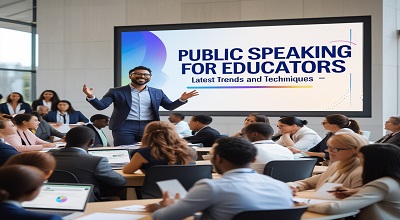Public Speaking for Educators
Public Speaking for Educators: Public speaking is a crucial skill for educators, whether they are addressing students, colleagues, or a broader audience. Effective communication enhances teaching, professional development, and leadership in the education sector. In this comprehensive guide, we will explore the latest trends, techniques, and strategies for educators to improve their public speaking skills.
At TeacherEducator.com, we understand the importance of confident and engaging communication in education. This blog post will cover essential aspects of public speaking, from overcoming anxiety to leveraging technology for impactful presentations.
Why Public Speaking Matters for Educators
Public speaking is not just for politicians or corporate leaders—educators also need strong communication skills to:
- Deliver engaging lessons – Captivating students requires clarity and enthusiasm.
- Lead professional development sessions – Sharing knowledge with peers demands confidence.
- Advocate for educational policies – Influencing stakeholders requires persuasive speaking.
- Build a personal brand – Educators who speak well gain recognition in their field.
Key Benefits of Public Speaking for Teachers
✅ Improved classroom engagement
✅ Enhanced professional credibility
✅ Greater influence in educational discussions
✅ Increased confidence in leadership roles
More Here: Quiz Tools for Engaging Classroom Learning
Overcoming Public Speaking Anxiety
Many educators experience glossophobia (fear of public speaking). Here’s how to manage it:
Strategies to Reduce Anxiety
✔ Practice Regularly – Rehearse in front of a mirror or record yourself.
✔ Use Breathing Techniques – Deep breathing calms nerves.
✔ Start Small – Begin with smaller groups before larger audiences.
✔ Positive Visualization – Imagine a successful speech.
Essential Public Speaking Techniques for Teachers
A. Structuring Your Speech
- Introduction – Hook the audience with a question or story.
- Body – Organize key points logically.
- Conclusion – Summarize and end with a call to action.
B. Storytelling in Education
- Stories make lessons memorable. Use:
- Personal anecdotes
- Case studies
- Historical examples
C. The Power of Pauses
Pausing helps emphasize points and gives the audience time to absorb information.
The Role of Body Language and Voice Modulation
Effective Body Language Tips
- Eye Contact – Builds connection with the audience.
- Hand Gestures – Use natural movements to emphasize points.
- Movement – Avoid standing rigidly; move purposefully.
Voice Modulation Techniques
- Vary Pitch & Tone – Monotone voices lose attention.
- Control Speed – Speak slowly for important points.
- Adjust Volume – Use loudness for emphasis.
Using Technology to Enhance Presentations
- Modern educators can leverage:
- Slides (PowerPoint, Google Slides) – Keep them simple and visual.
- Video Clips – Break monotony with multimedia.
- Interactive Polls (Mentimeter, Kahoot!) – Engage the audience in real-time.
Engaging Your Audience: Interactive Speaking Strategies
Ways to Keep Listeners Engaged
- Ask open-ended questions
- Use humor appropriately
- Encourage group discussions
- Incorporate real-world examples
Public Speaking for Professional Development
Educators can grow professionally by:
- Presenting at conferences
- Hosting webinars
- Participating in panel discussions
Latest Trends in Educational Public Speaking
2025 Trends to Watch
- Hybrid Presentations – Combining in-person and virtual audiences.
- AI-Assisted Speech Writing – Tools like ChatGPT help draft speeches.
- Data-Driven Talks – Using statistics to strengthen arguments.
Common Mistakes and How to Avoid Them?
❌ Reading from Slides – Use bullet points as prompts, not scripts.
❌ Ignoring Audience Feedback – Adjust based on listener reactions.
❌ Rushing Through Content – Pace yourself for clarity.
FAQs on Public Speaking for Educators
Q1: How can I improve my public speaking skills quickly?
A: Practice daily, seek feedback, and watch TED Talks for inspiration.
Q2: What if I forget my speech?
A: Keep notes handy and pause to recollect—audiences understand mistakes.
Q3: How do I handle tough questions?
A: Stay calm, acknowledge the question, and respond thoughtfully.
Free Here: YouTube Vanced APK
Conclusion
Public speaking is an essential skill for educators, impacting classroom success and professional growth. By applying the latest techniques—such as storytelling, body language mastery, and tech integration—teachers can become more confident and effective communicators.
At TeacherEducator.com, we empower educators with the tools they need to excel. Start refining your public speaking skills today and unlock new opportunities in your teaching career!
